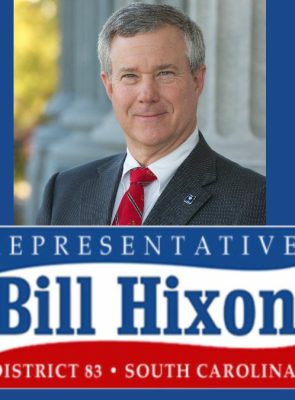Senator Tom Young and I have had several meetings with Governor McMaster, his staff, and South Carolina’s Attorney General Alan Wilson about the Savannah River Lock and Dam. I met with Senator Young, Governor McMaster, Col. Hibner and two of his staff from the Corps of engineers in our Governor’s office last Thursday. We talked for over an hour. Senator Young and I along with Governor McMaster let the Corps know that North Augusta, South Carolina wanted to remain SOUTH CAROLINA’S RIVER FRONT not CREEK FRONT. We will not settle for the MUD FLATS they showed us the other day! The Governor reassured us he would do whatever he could to help. Stand by: there is a lot more work to be done; never give up!
Overview: These past few weeks have been busy in Columbia. Progress was made on the comprehensive education reform bill and this year’s budget was successfully passed out of the Ways and Means Committee. The 2019-2020 budget is built on the foundation of protecting taxpayers, a renewed commitment to being resourceful and efficient, funding only core functions of state government, and providing value for every dollar we vote to spend. Because of our fiscally conservative budgeting, South Carolina is currently one of only fourteen states with a AAA credit rating according to Moody’s. Our debt level is .39% of state revenues which is significantly lower than our constitutionally set 5% limit. In addition to efficiently funding the normal core functions of government, this year we are making substantive investments in education and workforce development. We have prioritized public and higher education not only because we owe it to our students, but also to ensure our students are prepared for the workforce.
Highlights from the House Ways and Means Committee Budget Proposal:
- Almost $160 million to provide teachers a pay raise, helping to ensure that we recruit and retain the very best teachers.
- $44 million in recurring funds to colleges in exchange for an agreement to freeze the cost of tuition for in-state undergrad students.
- Almost $78 million for improvements to workforce partnership programs in technical colleges, including funding for training new workers, purchasing new workforce equipment and more.
- $40 million for new, paper-backup voting machines to ensure our election process is secure and fair.
- $20 million to exempt from income taxes the retirement income of military veterans and first responders, saving the average first responder and military veteran $350 each year.
Amendments to the Education Bill: On Wednesday, Gov. Henry McMaster, House Speaker Jay Lucas, S.C. Superintendent of Education Molly Spearman, and State Sen. Greg Hembree held a press conference in support of the comprehensive education reform bill. After hearing input and concerns from teachers, parents, students and the business community, the original legislation was amended, and the bill is now stronger with the foundations of bold reform still intact. The Education K-12 Subcommittee began hearing debate and amendments following the press conference and passed the amended bill out of the subcommittee on Thursday morning. The bill currently has 84 co-sponsors and is scheduled to be taken up in the full House Education Committee next week.
Legislative News
Regulating Hemp: The House passed H.3449 to remove the cap on the number of permitted hemp farms. Farmers will still need to apply for a permit with the S.C. Department of Agriculture, but there will no longer be a cap for the number of permits available or limits on the number of acres that can be planted with hemp.
SC Energy Freedom Act: On Thursday, I proudly voted for the “SC Energy Freedom Act,” that will expand Solar Energy options in SC. The bill passed the House unanimously and will extend current rooftop solar customer “net metering” until 2021 and provide for the long-term net-metering rate to be set by the Public Service Commission. The bill requires utility companies to create programs for individuals to participate in community-based solar projects and establishes requirements to ensure access for low and moderate-income individuals.
Palmetto Scholarship Protection:
- H.3936 was introduced in the House this week to protect high-performing students from paying a penalty for starting at a two-year or technical college. This bill closes a loophole in the law and will now ensure that a student who uses a Palmetto Fellows Scholarship to attend an eligible two-year or technical school can receive a maximum of four continuous semesters that can also be used to attend an eligible four-year college.
Move Over Month: The House voted approval of a bill H.3388 designating March as “Move Over Awareness Month” in S.C. DOT and Public Safety are charged with conducting programs during the month of March every year that emphasize the importance of motor vehicle drivers moving over into an adjacent lane whenever possible when approaching or passing through a highway work zone, an emergency scene, or any other traffic incident.
 Coyote Bounty: One state senator introduced a bill (S.489) calling for a $75 bounty on every killed coyote. He would pay for it by adding $1 to state hunting license fees. There is no disagreement that coyotes have become a costly nuisance and a threat across the SC. The population has gotten far out of hand with an estimated 350,000 coyote’s roaming the state. Sen. Stephen Goldfinch says he thinks it’s time for hunters and other sportsmen to go to war with coyotes.
Coyote Bounty: One state senator introduced a bill (S.489) calling for a $75 bounty on every killed coyote. He would pay for it by adding $1 to state hunting license fees. There is no disagreement that coyotes have become a costly nuisance and a threat across the SC. The population has gotten far out of hand with an estimated 350,000 coyote’s roaming the state. Sen. Stephen Goldfinch says he thinks it’s time for hunters and other sportsmen to go to war with coyotes.
Free Range Parenting: A Senate panel endorsed a bill (S.79) that would loosen restriction on how parents are allowed to raise their children. The bill would amend SC’s child abuse and neglect law to state that children who are old enough and mature enough don’t always have to have adult supervision. In my view, this pulls back the government nanny-state and places responsibility for child rearing where it belongs – with parents and common sense.
Death Penalty Bill Revived: Senators passed a bill bringing back the electric chair for the state’s death row executions, as well as adding firing squads as an execution option. The legislation passed the Senate 26-13 and was sent to the House where a similar proposal died last year. The bill is an attempt to address the S.C. Corrections Department’s inability to carry out executions because it does not have the chemicals needed for lethal injections. Currently, the state’s 35 death row inmates can insist on lethal injection, effectively blocking their executions.
 Savannah River Lock and Dam: The lock and dam is very important for the river frontage in North Augusta/Aiken County and Augusta because it maintains the river’s water level between the two cities. The Savannah Harbor in Savannah is currently being deepened for the Savannah Port. Construction of a fish passage for the Shortnosed Sturgeon is a condition of a required permit because the harbor deepening will destroy some habitat of the fish and it is believed that allowing the fish to travel in the river above the Lock and Dam will mitigate this damage. There is no fish passage with the current Lock and Dam which is over 80 years old. Rather than repair the existing Lock and Dam and add a separate fish passage, the Army Corps’ preferred alternative is to build a rock weir in the river near the current Lock and Dam. Because the rock weir will be fixed (and not adjustable like the existing Lock and Dam), the water level must be lowered between North Augusta and Augusta to prevent flooding concerns. Last week, the Army Corps of Engineers lowered the Savannah River pool between North Augusta and Augusta to the level where it will be permanently if the Corps’ preferred alternative moves forward. To see the Army Corps’ projected models for different alternatives, go here. To see a recent editorial in the Augusta paper opposing the Army Corps’ preferred alternative, go here.
Savannah River Lock and Dam: The lock and dam is very important for the river frontage in North Augusta/Aiken County and Augusta because it maintains the river’s water level between the two cities. The Savannah Harbor in Savannah is currently being deepened for the Savannah Port. Construction of a fish passage for the Shortnosed Sturgeon is a condition of a required permit because the harbor deepening will destroy some habitat of the fish and it is believed that allowing the fish to travel in the river above the Lock and Dam will mitigate this damage. There is no fish passage with the current Lock and Dam which is over 80 years old. Rather than repair the existing Lock and Dam and add a separate fish passage, the Army Corps’ preferred alternative is to build a rock weir in the river near the current Lock and Dam. Because the rock weir will be fixed (and not adjustable like the existing Lock and Dam), the water level must be lowered between North Augusta and Augusta to prevent flooding concerns. Last week, the Army Corps of Engineers lowered the Savannah River pool between North Augusta and Augusta to the level where it will be permanently if the Corps’ preferred alternative moves forward. To see the Army Corps’ projected models for different alternatives, go here. To see a recent editorial in the Augusta paper opposing the Army Corps’ preferred alternative, go here.
State Government News
Judicial, College Board, and Public Service Commission Elections: On February 6, the General Assembly met in joint session to elect several positions. To see the judges elected, go here. The college board and Public Service Commission seats filled were as follows:
- Citadel Board of Visitors, at-large – James E. Nicholson, Jr.
- College of Charleston, 5th district, seat 10 – R. McLaurin Burch
- Public Service Commission, seat 2 – Florence P. Belser



